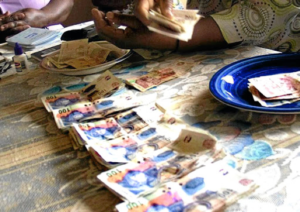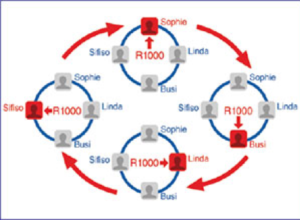MONEY CLUBS/ ROUND/ STOKVELS

I was not planning to write about money clubs/Stokvel at this juncture but a friend and fan of the blog asked me about them and I figured why not? I love money clubs, grocery clubs, building clubs, etc. They are a uniquely African solution to challenges faced by African women (I know women in other countries use them). I actually think under the right circumstances women all over the world should use them (and men too!).
Discussions about money clubs are often controversial and get very personal really quickly so I am going to focus on how you can decide if this is a good money decision for you. One of my favorite Facebook groups with over 40,000 Zimbabwean women often has some lovely & heated debates on the issue. More power to the ladies of PH and the admins who hold us all steady.
By focusing on how the clubs work I think we avoid value judgments about the system and instead strengthen good financial habits that can benefit us if we choose to join them or use other savings strategies.
What is a Money Club and How Does it Work?

Figure 1: How money clubs work
The idea behind money clubs is very simple. Members of a group come together and agree on an amount to contribute each month. A single member of the group receives the pooled funds on a monthly rotation.
Example: A Group has 6 members named 1-6
The cycle of the club runs for 6 months
Each member contributes $100 to the club for a total of $600
Each month one member is given $600 until the cycle is complete
Money clubs have a long history in most developing countries. My mom and almost all the women in our family have been part of a money club at some point. I benefited from a money club when planned our wedding – it was a lifesaver!
Saving is HARD!
I think of money clubs as savings training wheels. It is really hard to commit to setting aside 20% of your income because life happens. As women, we know this. If mom or mom in law needs something we often have to pull from our savings, if the baby needs something for school or if the church is doing a fundraiser, we often find ourselves pulling from our savings. If our money is in a money club then we can’t reach it, so we do not have to spend away from our savings on unplanned “emergencies”.
Sometimes Banks DO NOT WORK! Between the bank fees, poor interest rates and inflation sometimes banks are not an option. Women in Zimbabwe understand this all too well. So being a member of savings club forces us to put our money in a relatively safe option. The rate of default in most money clubs is actually quite low. I have followed over 100 clubs and only 3 have had major defaults. Banks should loan more money to women!
Before you join a money club- here are some things to consider
- Do you have a monthly budget?
- Being a part of a savings club does not eliminate the need for a budget. How else will you know what type of club works for you and how much you can afford to contribute per month
You can read more about making a budget on this post
- If you do not have a CLEAR budget, you may end up borrowing from other needs to cover your share of the contribution or you may end up defaulting which will be bad for the club
- Do you have CLEAR MONEY goals?
- I want to save is not enough because if you do not have clear goals when you receive that $600 windfall you will end up with idle money which now knows is not a good idea.
- You will need to have clear short- and long-term goals
- How much can I afford to lose and how much can I afford to be without
- Although default rates are low things do happen so you have to check your budget to determine how much money you can afford to lose
- Also, determine how much money you can afford to be without for the duration of the cycle – these two numbers determine the money club level that works for you.
e.g. if you earn $1,000 a month the most you can contribute to a money club is $200- the real number is likely less depending on how much you need for rent etc. My rule of thumb is that this should be 20% or less of your income. Even when you are in a money club you still need at least $500 for an emergency fund depending on your situation. A MONEY CLUB IS NOT AN EMERGENCY FUND
If you do not have a monthly budget and if you do not have CLEAR money goals, you are not ready for a money club J
Goal setting is a private conversation between you and yourself or with your partner. As with any other money issue please be honest with yourself.
Let us look at some good examples of money goals
- Goal – Pay or a Wedding or DOWRY ($5,000) due 12-month period
- This is a really good reason to join a money club. Most short-term interest rates are less than 3% (at least in the US & UK) and some accounts have high fees so, in this case, putting in a bank even when possible may be frustrating.
- Let’s say there are 5 people in the club each one contributing $500- the receivers will get $2,500 (including their contribution). Over a 12-month period, each person will receive twice
- As soon as you receive your payout make sure to settle at least one bill towards your end goal. Pay for the wedding dresses, pay for the cake, wedding venue – take care of other big-ticket items.
- Goal – buy a new stove ($1000 )due in 6 months
- This is not the type of goal where you can pre-pay unless there is a layaway option. In this case, I would join a club that paid out as close as possible to my goal. You want to avoid idle money
- Goal – pay expenses related to a kid going to the first year of high school ($1500) 12 months
- This is another great example of where you can make purchases towards the end goal as you go along
- Each time you receive a payout purchase school uniforms, notebooks, pay your tuition deposit and other related expenses
- Goal- pay for adult education ($2000) due in 12 months
- In this case, you may want to use payouts to pay tuition deposit, invest in school supplies or negotiate to move places so that you receive double the amount the month you have to pay tuition.
- Goal – Go home for a visit (estimated cost $3,000) in 18 months
- If you are in the diaspora – a money club could be a great way to make purchases towards your trip home. You can buy your ticket earlier and take advantage of cheaper rates. You can buy all the gifts you want to carry with you.
- Goal- Starting a small business ($500) in a year
- Money clubs are great for supporting your multiple streams of income initiatives. I have been reading that Somali expats in South Africa often pull money in this way to start up small businesses. In fact, when I asked around some of my girlfriends told me that they used funds from money clubs to fund their businesses and they have reinvested profits from the business to keep the club going. This is a HUGE win for small business.
- In my case, we used funds from our money club to help pay off debt and stock up. Eventually, we used our payout to give ourselves a bonus every 6 months.
- Goal- House down payment ($10,000) due in a year
- My favorite money club story is of 10 Zimbabwean women in Texas who used the money club to pay down deposits or outright purchase their homes. Each member of the group paid in $2000 a month for a total payout of $20,000. $20,000 was the perfect number for settling their down payments or paying off the mortgage.
Take away

So, my friend – if you are deciding whether or not a money club is right for you the answer is in your budget and your long/short term goals. Once I was done paying off my debt, I decided that I no longer needed a money club and shifted my focus to direct deposits in my savings account as well as maxing my retirement benefits. Our next major goals are scheduled for 3 years from now so if I were to join a money club, I would end up with idle money which is not good for me.
Please share with me stories about your experience with money clubs-THANK YOU!!!!

Yes wish to join
I agree
Thank you for sharing your experiences, tips and suggestions. I am in United States and Money Clubs are really starting to blossom here. Your blog helped me decide whether or not I should move forward with joining a money club. Thanks again!